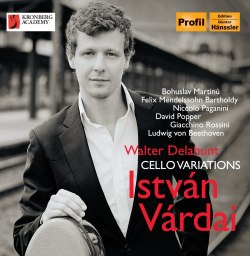| 
|
Cello Variations
Bohuslav MARTINŮ (1890-1959)
Variations on a theme by Rossini, H 290 (1942) [7:54]
Felix MENDELSSOHN (1809-1847)
Variations concertantes, Op. 17 (1829) [9:12]
Ludwig van BEETHOVEN (1770-1827)
Twelve variations on ‘Ein Mädchen oder Weibchen’ from Mozart’s ‘The Magic Flute’ (1796) [9:21]
Bohuslav MARTINŮ
Variations in a Slovak Theme, H 378 (1959) [9:09]
David POPPER (1843-1913)
Fantasy on Little Russian Songs, Op. 43 [11:57]
Niccolo PAGANINI (1782-1840)
‘Une Larme’ theme and variations [9:49]
Gioachino ROSSINI (1792-1868)
Sonata a Preghiera: Introduction and variations on ‘’Dal tuo stellato soglio’ from Rossini’s ‘Mosè in Egitto’, Op. 24 [6:59]
István Várdai (cello)
Walter Delahunt (piano)
rec. live, 29 September, 2 October 2012, 30 September 2013, Sendesaal, Hessischen Rundfunk, Frankfurt am Main, Germany
HÄNSSLER PROFIL PH13020 [64:25]
This release centres on the playing of Hungarian cellist István Várdai paired with Canadian pianist Walter Delahunt with seven works from six different composers. It has been issued to correspond with the Kronberg Academy Festival, Germany at which the Academy celebrates its twentieth anniversary since its founding in 1993.
Born in Pécs in 1985 Várdai was admitted to the Kronberg Academy in 2010 studying with Professor Frans Helmerson until 2013 when he joined the Academy staff. A recipient of Academy’s Boris Pergamenschikow Scholarship, Várdai has accumulated a remarkable number of prestigious awards at international music competitions. These include triple winner of the International David Popper Violoncello Competition, Budapest in 2000, 2003 and 2004, the International Johannes Brahms Competition 2006 in Pörtschach, Austria, the 63rd Geneva International Music Competition in 2008 and the Prix Montblanc 2012 at the Konzerthaus, Berlin. Pianist Walter Delahunt has held down a successful international career since graduating from the University of Toronto in 1978. Delahunt has held a number of teaching positions including the Royal Conservatory of Music, Toronto, the Banff School of Fine Arts, the McGill University, the Vienna Academy of Music and the Frankfurt University of Music and Performing Arts.
In the booklet notes Várdai writes that all the works for cello and piano contained on the release have featured significantly during his studies. He has used a number of them as competition entries. With all of the seven scores selected here being variations Várdai points out that “a great deal of inventive fantasy and musical knowledge is required to breathe life into a variation form...” Keen to avoid what he describes as a “sterile studio recording” Várdai endeavoured to play before an audience in live performance.
This seven work programme of cello variations will be well known to cellists. It provides an impressive contrast between technical and artistic interpretation.
I especially enjoyed Martinů’s Variations on a theme by Rossini written for the Gregor Piatigorsky in 1942. With its main theme Mosè’s prayer based on Rossini’s opera Mosè in Egitto and followed by four variations and a finale the writing displays a frequently frenzied and often unsettling character. The attractive and languid slow section at 3:43-5:50 is a welcome contrast and Várdai plays it with implacable tenderness.
Mendelssohn’s Variations concertantes with its simple yet elegant D major theme and eight variations is highly appealing. It was written for his brother Paul in 1829. Not a professional musician Paul, a banker at the distinguished Berlin private bank Mendelssohn & Company, was it seems a reasonable amateur cellist. Notwithstanding its moderate cello part this is a delightful work that bursts into a highly passionate penultimate variation.
The stand-out work is Beethoven’s twelve variations on Papageno’s aria Ein Mädchen oder Weibchen from Mozart’s The Magic Flute. Composed in 1796 this charming masterwork is beautifully done. Várdai and Delahunt play it with relish and a sense of spontaneity.
The sound quality is most acceptable with an especially effective balance between the slightly forward cello and the piano. I could not detect any extraneous audience noise and the applause has been taken out. In spite of the undoubted quality of the works in truth I found listening to over an hour of cello variations in a single sitting a touch tedious.
This splendid release will primarily appeal to the cello enthusiast.
Michael Cookson
 |
 |
|
